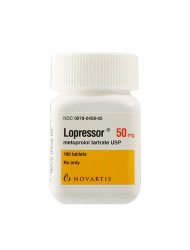Lopressor (metoprolol) Coupons, Discounts & Cost
Lopressor (metoprolol) is a drug with antianginal, antihypertensive and antiarrhythmic action. One way to save money on the Lopressor retail cost regardless of income and insurance status is to use Lopressor coupons or discount cards from RXCoupons. Use this Metoprolol coupon at this online pharmacy and receive up to 75% off the sale price.
Lopressor pharmacological properties
Lopressor (metoprolol) is a drug with antianginal, antihypertensive and antiarrhythmic action. The active substance slows the heart rate, slows atrioventricular conduction, reduces myocardial oxygen demand.
Lopressor is used in the treatment of coronary heart disease: myocardial infarction (in the complex therapy), prevention of angina attacks. It is used as monotherapy or in combination treatment with other antihypertensive agents in hypertension (including tachycardia), hyperthyroidism (in the complex therapy), cardiac arrhythmias (including supraventricular tachycardia). It is sometimes used as prophylaxis in migraine attacks.
What are the contraindications for Lopressor?
The main contraindications for Lopressor: cardiogenic shock, sinoatrial block, atrioventricular block (II-III degree), severe bradycardia; sick sinus syndrome, Prinzmetal angina, decompensated heart failure, hypotension, simultaneous therapy with monoamine oxidase inhibitors or verapamil, hypersensitivity to the drug or to other beta-blockers.
Lopressor is not recommended for patients under 18 years of age, as well as during the period of breastfeeding.
Caution is recommended in patients with first degree AV block, metabolic acidosis, diabetes mellitus, chronic obstructive pulmonary disease (chronic obstructive bronchitis, emphysema), asthma, peripheral vascular disease (Raynaud's syndrome, intermittent claudication), myasthenia gravis, chronic renal or hepatic insufficiency, pheochromocytoma, thyrotoxicosis, psoriasis, depression. Lopressor should be used with caution in elderly patients and during pregnancy.
Lopressor recommendations for use
The tablets should be taken during or immediately after a meal, with water. The dosage regimen should be prescribed by the physician based on clinical indications.
The recommended daily dosage: secondary prevention of myocardial infarction: 200 mg in 2 divided doses (morning and evening).
Hypertension: 50-100 mg in 1 or 2 divided doses (initial dose). A gradual increase in the dose to 100-200 mg is recommended to achieve the therapeutic effect. The daily dose should not exceed 200 mg.
Tachycardia: 100 mg in 2 divided doses.
Angina, arrhythmia, prevention of migraine: 100-200 mg in 2 divided doses.
No dose adjustment is required in renal impairment, as well as in the treatment of elderly patients.
Side effects of Lopressor
Cardiovascular system: palpitations, sinus bradycardia, low blood pressure, orthostatic hypotension (dizziness, loss of consciousness); rarely - decreased myocardial contractility, arrhythmia, shortness of breath, swelling, Raynaud's syndrome.
Nervous system: weakness, fatigue, headache; rarely - anxiety, muscle weakness, drowsiness, depression, insomnia, confusion, nightmares, short-term memory impairment.
Digestive system: dry mouth, nausea, vomiting, abdominal pain, diarrhea or constipation, functional disorders of the liver.
Skin and other organs: pruritus, rash, urticaria, increased sweating, psoriasis, flushing, reversible alopecia; rarely - ringing in the ears, conjunctivitis, dryness and soreness of the eyes.
Endocrine system: hypoglycemia (in insulin-dependent diabetes mellitus); rarely - hypothyroidism, hyperglycemia (in diabetes).
Respiratory system: nasal congestion, bronchospasm at high doses.
Other reactions: rarely - back pain or joint pain, agranulocytosis, thrombocytopenia (unusual bleeding), leucopenia; very rarely - hyperbilirubinemia, growth retardation, hypoglycemia, reduced potency and libido.
Lopressor special instructions
Lopressor may exacerbate the symptoms of peripheral artery disease. Patients should gradually reduce the dose in case if they want to stop the therapy. Abrupt discontinuation of treatment may cause withdrawal syndrome (high blood pressure, angina attacks).
The drug may mask the signs of tachycardia and other symptoms of hyperthyroidism.
It should be borne in mind that reserpine and some other drugs may cause low blood pressure and bradycardia. Elderly patients need to monitor liver function and use lower doses of the drug in case of AV-block, bronchospasm, ventricular arrhythmias, bradycardia, severe liver dysfunction.
It is necessary to monitor the status of patients with depressive disorders. Treatment should be discontinued in case of signs of depression.
Do not use metoprolol concurrently with MAO inhibitors. It is necessary to wait at least 14 days before you can take MAO inhibitors.

